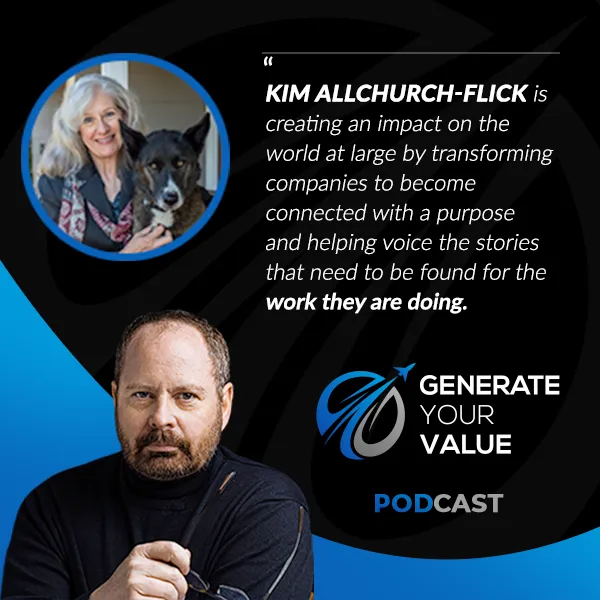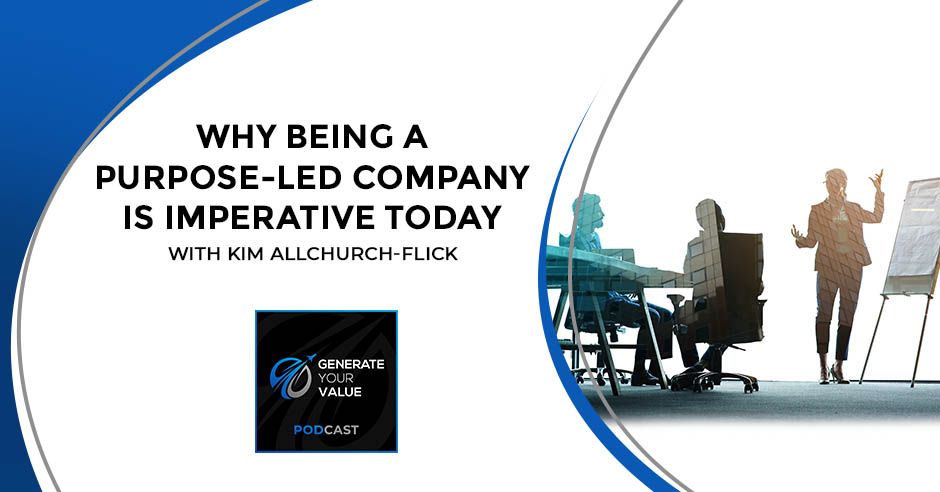In this era of great resignation, we know that the new generation of employees is looking for companies that connect them to a purpose. Now more than ever, being a purpose-led company is becoming very important. How do you transform and become one? In this episode, we sit down with none other than a social enterprise advocate, Kim Allchurch-Flick. She talks about the importance of purpose and its benefits to businesses and organizations. On involving with social issues, Kim discusses all about being a social enterprise and how companies can do more than just sell a product. Plus, she also shares her insights on introvert versus extrovert sales, the power of contrasts, and finding a purpose that connects you to your people and communities. Tune in as Kim tells us more about why it is imperative to be purpose-led, not only for your company but also for the world.
LISTEN TO THE PODCAST HERE
Why Being A Purpose-Led Company Is Imperative Today With Kim Allchurch-Flick
Andy, good to see you.
Good to see you. How was your weekend?
Busy. I will leave it at that.
Leave it at that?
A little late birthday celebration with a crew then packed to get up here to Kentucky.

You are in your wife’s territory.
The good old bluegrass state.
Home of bourbon, which our reading audience know Zach and I enjoy on our little bit of time off. We both leave busy lives. We don’t have much of an opportunity to do it but we enjoy the heck out of it when we do have that time.
I was going to say, we always make the most of it, so it’s good.
How often have you and I talked about this limited resource called time? It’s about the quality, shaping our lives, such that the quality of the time spend.
I say we talked about it all the time.
I saw what you did there. Zach, you and I have talked a lot about the word purpose and the why. We have even talked a little bit about the role of those two words in a company. When I got on a Zoom call with our guest and hearing her life story of what she does. I’m like, “Yes, I got to bring her on because it’s such an important topic.” Particularly with where we are now.
Given the divisiveness politically within the country and companies bringing their purpose more particularly with the younger generation saying, “We are not going to do business with you unless we understand what your purpose is and what you stand for and how you interact with a larger community in your ecosystem.” It’s the right time. The universe is working now to bring our guests in to have this conversation. I’m excited about it.
Our guest is Kim Allchurch-Flick. She’s based out in the great State of Oregon, which is beautiful. If you haven’t hopped on a plane or in a car and gone to the sea of the seashores of Oregon or the Columbia River, wine country, or whatever it may be, you are missing out. You are. I can’t say enough about the State of Oregon. Go out and see it if you have it. Put it on your bucket list.
As we typically do, once again, we brought on a guest whose bio fits a whole flipping page and it could take up the whole 45 minutes of going through her bio. We are not going to do that. I’m going to hit some highlights of her bio and we will let her fill in the not the holes but fill in the gaps from what I do in terms of reading her bio and move on from there.
Kim has had a life of contrast. You and I talked a lot, Zach, about contrast. We love contrast and what it teaches us. She, before the age of thirteen, grew up in the US, Holland, Belgium, and England. That’s a mouthful and a lot of times was in small towns and in those areas. Came back to the US and lived in a small town.
She’s a small-town girl, who went and got her undergraduate degree in Biology. We are going to let her tell the story of how it is that she got into Biology. She got into the medical fields, and sales and started learning about business and got an acumen within the business like myself, ran into a situation where she got laid off and was like, “What do I do with myself?” As I did.
Decided to go back to earn a Master’s Degree and a certificate in the Business of Social Enterprise.
She’s now in a spot where she helps companies through that. How do I become a social enterprise? How do I get connected to the right people that are going to help me in my business to be a social enterprise in what direction we should be? I can’t wait for a conversation. Kim, thank you so much for your valuable time, and that finite resource that you have in your own life to come to talk to Zach and I. Welcome to the show.
Thank you so much. I’m truly honored. I appreciate it.
We always like to give 3, 4, 5, or 6 minutes to our guests at the very beginning to talk about your life story, how you made choices that you made in your life to the point where you got to where you are now and anything you want to flush out in that. The floor is yours.
Thank you. The contrast in life, I was thinking about in preparation for this. It’s interesting to have a life that has some contrast and look back on them because when we are in it, we don’t know all the time. My father was English and he immigrated here. That’s one of the reasons we lived overseas and were born in the US but my first foray into another country was in first grade going to a small town in Holland.
We lived in, as I remember it, a townhouse that was across from a pasture. I used to go play in the pasture and visit the cows. I also enjoyed looking at grass and playing in it and my sister, who was younger than me, she would come with me. Being in nature was part of the way that I had fun. I always enjoyed being out there. It could be raining or sunny.
Also, at that time, I didn’t speak any Dutch but I went to a school where the teacher didn’t speak any English. The plasticity of our brains, when we are like six years old, is amazing because my sister and I both came out speaking fluent Dutch. To this day, I can barely count to ten after we moved away from it. I have a book that’s written by that teacher. It’s all in Dutch except for a couple of sentences about my progress in that little first-grade school.
We moved to Belgium after that and I don’t have that much recollection of Belgium, then back to the US then into England. In England, we were in a country village called Chedworth, very small. The center of the village had a pub and a baker’s house and a church. That’s England. Behind us were pastures and we would go play in these pastures and just notice things.
It was so much fun to watch a stream and find some cress and bring cress home. My mom would make a salad out of it but with that there were frogs and playing with tadpoles. All of this became part of what recreation was, fun, getting out of the house, and that thing. I don’t know a lot of things back then but I was an introvert. I am an introvert and part of that is what nature does a lot for me in terms of where’s a good place to be alone. Where’s a good place to be isolated?
The outdoors is usually one of the best because it’s regenerative. It’s peaceful usually and I never realized how much that’s woven into my life. Even though I love cities in contrast. I love being in cities sometimes but being out in nature is where I thrive. We left England and moved to Parachute, Colorado because my parents were getting a divorce and my grandmother lived there. She owned this little motel called the Log Cabin Motel. It was twelve log cabins and I helped her with that. This town had 500 people in the population. My class was eleven kids.
What part of the State of Colorado was it in?
It is toward the Western slope.
Mountains are involved.
Mountains are involved in a lot of dirt roads and a lot of dust. It was an interesting town. It’s not the town that you would want to stay in after high school. I left before graduating high school but it was a great place to be a kid because again, outdoors. My friend and I had a paper route that we split. We rode our bikes on gravel roads, tossing papers and we’d go hang around together by the river. It was such a wonderful place in a lot of ways.
One of my favorite classes in that school was biology class. While a lot of kids didn’t like doing things like dissecting and learning about animals. My friend who later became a physician, we were into it. We enjoyed it. The contrast came about when I moved to a bigger town and spent the last three years of high school in Glenwood Springs, Colorado, which isn’t large by most people. People who come from cities know that this is not large but going from 11 in a graduating class to 135. That was a big deal.
By contrast, what I got is not as much access to nature. There were more things going on. I was a lot busier. I was in high school and starting to get jobs and things like that, but there were more choices within the school. I found that it was super encouraging. Fast forward to going to college, that was a big contrast because the opening biology class in my freshman year was 400 kids. I was going from 11 to 135 to 400. The introvert starts to play out because I didn’t realize that you could approach an instructor and talk to them and show them interest or even ask a question. I thought the whole idea was to hide, absorb, burrow in, study, and do a good job. That’s what I did.
The professors don’t encourage that.
Not in the 400 classes. Later on, when the classes are smaller and they are more focused, they do. I also didn’t realize that part of the goal of a class of 400 is to see how many people to get rid of in a great amount. A lot of that I didn’t understand. I wasn’t prepared for that type of thing. The unfortunate thing about going to that school was that it was a great school, CSU in Fort Collins, and the great outdoors that I would get up in the morning and hop on my bike and go find places to ride to start my day on. It’s great.
Beautiful area. East of Estes Park.
What happened was one of my friends, she was raped. I was there for a part of it, got out, and called the campus police. It turned into such a trauma for her and a memorable one for me. This was my freshman year in college. In talking with my mom about it, she was very concerned. We decided that I should leave.
I went to transferred to Mesa State College, which is in Grand Junction, Colorado, smaller. That for me was good. My friend went through so much and I went with her. There was a court involved. Fast forward to the Kavanaugh hearings when Christine Blasey Ford was talking about it. It brought back so many memories of how familiar that scenario was.
I think it was good to have a change for me too. I thought I would go to CSU and graduate but Mesa State offered quite a bit as well. Even though they didn’t have as much in the biology classes because of budget, we still had terrific training. Why I chose biology? It’s because I thought science was fun and because it took me back to those times when I was in the pastures and playing around and noticing animals and noticing what was growing. Usually being out there either with a dog, pony, or something. That’s what took me to a Biology Major.
At that age, I didn’t plan on what I was going to do to make a living. I was lucky that while I was in Grand Junction, the hospital and some job postings were part-time fit into my being able to go to school. I was thrown right into the cardiopulmonary department where I learned to do EKGs and more. It was a trauma center, so it took me into the ER, ICU, and the cardiac and I fell in love with that. That’s how I got a career in sales and later in medicine. Mostly in critical care and that lasted for years. A lot of contrast there.
We have a better understanding now of how it is that the love of biology showed up for you. I’d have to imagine as an introvert engaging with animals that don’t speak to you. You don’t have to engage. It was a lot more beneficial for an introvert as opposed to an extrovert that needs that dialogue, engagement, and banter back and forth to have that excitement and joy in their life. To be able to engage with animals where you could, I don’t want to say control the dial but you are allowing life to unfold in front of you with the animals that brought joy to your heart. What about sales? I’m interested in being an introvert in sales. What is it about sales that interests you being an introvert?
That question is so important. Part of it, at the time, not knowing the words introvert and extrovert as they are used now. This is before the book Quiet was written. I was in companies where it was encouraged to be exuberant and sales meetings were always exuberant. They would put on shows. The interesting contrast about being in medical sales is I had a territory.

The first company I worked for, I had a territory that was half the State of Oregon and half the State of Washington. I would drive by myself to go to hospitals and talk with people. Usually, one-on-one and get back and drive somewhere else. It’s this balance of being connected to people and then being quiet and alone. It was perfect.
In sales training and in meetings. I’d have to do, in my brain now, I called switching my brain. You have to play a role because it was made clear. Particularly, back then that the expectation is that sales is one of exuberance and people that are out there and extroverted. Even though they didn’t say that word.
That’s hard for introverts and I’m not the only one by any means. When you are in meetings from, say, starting with breakfast at 7:00 then it goes to 5:00 then they have group dinners, then there’s stuff after that.
They would usually pair people up and have roommates and stay in these hotels. There’s no place to go and hide. What I learned to do was skip lunch and go for a walk. It’s like the place. When these sales meetings had 2,000 or 3000 people in them. Nobody’s going to miss me. I also learned from a mentor of mine who’s wise that when there’s a dinner or a cocktail gathering or something like that, he would always say, “Pick 3 to 5 people, you want them to know that you were in the room. Once you have accomplished that goal, then you can quietly sneak off and do what you like to do.”
That’s how introverts start to survive in that situation but we didn’t know the words for it. I was promoted to sales manager in a new startup and it was a terrific opportunity. I was getting an MBA at the same time. One of their codes was for hiring. As a startup, we were hiring our entire teams and I love being in that role but they gave us the profile of hiring young, hungry, and three years of experience, which means you get a group of people that are very similar and exuberant. That was another word they wanted.
I tend to be more of a quiet and introspective type. I hired quite a few introverts and a huge variety of people from different places. Our team ended up doing well. There was diversity there that was not necessarily intentional but I saw that there were people who had good potential and were also potentially quiet.
Moving fast forward, that’s how I got through work. I loved it but having these balanced in contrast to being able to work by myself, always working from home or out in a car. Cars are an office when you are in outside sales and airplanes. That’s another place being in a tube full of people and you can be, with the headphones on, as quiet and peaceful and contained.
That’s how it feels to be able to get through that. Yet, knowing that the other parts of it are important. Engaging people with people is important. I’m not great at small talk and crowds of people but I’m the one in the corner having a conversation with somebody else who’s fascinating. That’s where some of the magic happens in those conversations.
Zach, I don’t know if I have ever asked you point blank. Do you consider yourself an extrovert or an introvert?
Yes. It completely depends on the context.
Zach leads sales teams. Do you have introverts on your sales team?
Yes.
How do you engage with them?
I found a lot of introverts if you get them one-on-one. With most that I have coached, brought up, and trained, it’s getting them one-on-one building trust and a relationship. They come out of the cocoon and you can dig in with them. It is teaching them a system to where it’s not emotionally draining for them to go talk to a bunch of people. It’s systematized, so they can keep that energy for themselves. Kim, as you said, it’s making sure that they schedule them time so that they don’t completely drain their social battery. It’s a balancing act.
I concur. There hadn’t been words for it. Susan Cain wrote the book Quiet and talks about sometimes being on the receiving end. The clients and customers respond better to some people who are quieter because there’s more of a listening component to it but I don’t find that it’s either/or. I think now the word ambivert is popping up, which is true.
That’s pretty much where I am. Introvert doesn’t mean not liking people and wanting to be away from it. It’s more about having the balance of time to be away and think but with people having time for conversation, contemplation, and questions and it can be a joyful thing. I love doing things like going to outdoor concerts where there are people around. They are joyous and there’s a celebration but I don’t have to talk a lot because there’s something else going on.
Introvert doesn’t mean not liking people and wanting to be away from them. It is more about having the balance of time to be away and think and having time for conversation, contemplation, and questions.
It has more to do about energy and how your energy gets recharged.
Everybody has different charging stations.
Get recharged from the interaction and engagement with people. Whereas, introverts get recharged from their alone time. Generally, your energy gets used up through social engagement-type activities. It’s more about how it is that you get recharged. I consider myself an introvert but I learned how to be an extrovert. I’m more of an ambivert now because I have built up those skills but I still need my alone time to recharge my battery.
Kim, to your point about sales with introverts, I have found the overly extroverted person, when they get into a sales role. They become the salesperson that everybody thinks of. They just talk and they tell instead of sell, if you will. Whereas like you are saying with an introvert, they have got the makings because you have got 2 ears, and 1 mouth is what I was always told.
That’s the way I was trained in sales. It was asking a question. Let the client talk so you can find their need, find their pain points, and fix it. It’s a much smoother and more organic process that I have found with an introvert than having to tone somebody down and say, “Yank on their reins,” if you will. You’d be a little less choppy at the bit.
We have all been a buyer on the other side of both types of that. It’s about finding a match that’s comfortable for both people because sometimes the clients are very shy and introverted as well. Sometimes, they are busy and we need to get to the point. Part of that is listening and being able to solve a need and being of value that way too. No assumptions. You can’t assume and go in like a fire hose and assume that they want what we have.
There’s a saying about assuming that we all know, so ask questions first.
We also had a previous guest who led a number of sales teams in the information data side of New York City. In our interview, she said that the best salespeople she’s seen were introverts, which was surprising to her at the beginning of her career when we started leading sales teams but didn’t surprise her as the years went on, and found more introverts because they listen to understand. They give the client that space and opportunity to talk about their needs and so forth as opposed to what Zack was saying, that typical salesperson that’s telling all the time.
To a point, we are leading a little bit but I feel like also the sales environment as far as people go and what they are looking for in a service or sales something. It’s almost changed. You go back to the ‘90s corporate world of sales. It suited and sell a product. It was different, where now people are looking for an emotional connection. They are looking for more than just a product, I would say.
That’s a good segue. I want to move on from the subject and get to what I was alluding to in the intro. Kim, this is a heavy question. What do you feel is the role of why or a purpose for a human being in a business? It’s always been a major issue. It’s just that we are now starting to pay attention to it more but why is that important? Why should somebody or a company be paying attention to purpose?
There are a few reasons and it’s an important thing to think about because there’s work. People can go to work and go home and have those be two different things. The purpose is to earn a living and shut it off and have a life afterward. That doesn’t make anybody feel great. Having purpose within that work, I find is its joy. That makes work a great thing to go and to strive for because there’s something good that’s going to come out of the journey and the goals.

Sometimes that’s hard to articulate but even in the companies that I was in before in my corporate life. There were some that were toxic and not enjoyable places to be. There weren’t a lot but the vast majority of them were a place of purpose. The CEOs themselves would talk about their purpose. One of them had the purpose of wanting to eradicate malaria in the world. That is part of his goal and even though we were working on other medications. The scientists there would talk about the research that was coming up, they had a purpose of eradicating something or making life better.
Having purpose on a daily basis is one thing but having a purpose when you are in science, sometimes that purpose is 10, 15, or 20 years down the road but you won’t see it. What is a driving force? I see that as energizing and creating enthusiasm and also, in a way, wonder. How can we do things better? How can we do things with purpose? Whom can we affect?
On another scale, I find purpose is also can be very personal. It can be a company driven where the purpose is to do something good for a community or the environment or both. On a personal level, the purpose of being able to have something of value, say to be able to teach kids as well and say, “Going to work can be an amazing thing to do.”
What can we do for our communities? By going to work and making a thing. Now that I work with entrepreneurs a lot, I’m finding that for more people who have an idea to start a company, one of the first things they are talking about is the purpose of it. Sometimes, the purpose comes through their product or service but their purpose is there to give back to their community. It’s becoming imperative to the point where people are searching for companies that have a purpose.
There was a Nielsen study in 2017 that said, 2/3 of consumers are willing to pay more for a product or service when they know that the company has a good value set. That they have a purpose. I like to see this evolution through time because it also means that those consumers are also a backlash against companies that make false claims.
This is where authenticity comes in as well. Having a purpose is one thing. Acting upon the purpose with authenticity and sharing it is an imperative that is changing how we do things as consumers. How we do things as businesses working with other businesses. B2B is a great place to share purpose. I also see that in the ecosystem in the Portland Metro Area and in Oregon, there are founders, Black, Brown, Latino, and LGBTQ founders that are coming into their businesses and their products with a purpose that is expressed from their life story, their experiences and want to have a purpose of doing things that make things better for people like them as well and for other people.
Having a purpose is one thing. Acting upon the purpose with authenticity and sharing it is an imperative that is changing how we do things as consumers and businesses.
This is an important thing that is starting to come about. Creating a company not only around a product or service but creating a product or service for a purpose. There are examples of doing things, for instance, one of my favorite companies does oil changes. That is not an industry that’s been the environment historically but they are a B-Corp because their purpose is also so much about being as good at that as they can be for the environment, being innovative, and giving back to the community.
Their purpose is all over it and we still need oil changes. I think that’s a good example. In other companies, the product or service is part of the purpose. It’s an innovation like Cleantech or ways to do things better. That’s the purpose but they also have the purpose of doing well by their employees paying more than a living wage, and having good benefits because the purpose is to help create communities that are stronger.
What do you feel is the driving force or the driving desire behind companies wanting to delve further into social issues more so than selling a product?
What I’m seeing is that I think people are tired of that old paradigm. They want to get more joy out of their work. They want to get a more feeling of contribution and to be able to go to work because most of us have to go to work and earn a living. That’s imperative. To be able to live and to be able to put kids through school and buy a house, that becomes imperative. How can you do that with more joy, more focus, more giving, and basically, living the world a better place and doing that through work?

You talked about the suits and we know there are and maybe it’s stereotypical but I think some of it’s real. People that went to work and did what they were told, earned a living, came home and thought, “I’m going to do something good with my life when I retire.” That’s a huge shift now. People are looking to do good things all the time.
Why do I have to retire? Why do I have to wait until I retire to do that?
I think it’s also a realization a lot of people are having a lot younger of that whole system that we were taught of get a good job, work for 40 years is broken, so do something good now.
Indeed. I’m seeing it in large companies but we know for instance in Oregon and probably a lot of states that the local economies are built on small business. That’s what keeps local economies going. There are big industries that are also contributors but we can’t discount all these local companies that are doing some great things with their business and also with their purpose in their communities. That collective is what’s truly important about this whole idea of what is purpose.
Andy, we have talked about it before the awareness of people wanting to do something or be part of something bigger than themselves as well, more so now.
It’s a natural evolution. I don’t know the exact years but it’s been like 100 years since Ford developed an assembly line with the Model T. We had the industrial revolution, which was all about processes and scaling and mass production of things. We have now gotten into the data world, the internet, and things of that nature.
To a certain degree, high-level business has been introspective going, “This has been taught in our schools for years. We have been doing it this way for years. It’s time for the next step up or evolution for business. What is going to get people excited?” It’s gotten a little ho-hum. “Go to school, get my MBA, put in my time at the company, and retire then I get to do something I want to do in my life.” As opposed to going, “Let’s challenge that. Why can’t we start doing that now instead of waiting until we are 50, 55, or older to start doing something that’s beneficial to the world per se?”
The business world has been introspective of that and the younger generations are forcing that. I want to throw that question out to you, Kim. What are you seeing in terms of how generational differences are forcing this change? I keep hearing more of the younger generations, whether it’s X, Z, or whatever it is that’s pushing the issue of, 1) “I want to work for a company and I know the purpose.” That purpose is to make positive change in the world.”
Then 2) “I don’t want to do business with you unless you tell me what that is because I want to do business with.” As you said. Even if I pay a little bit more money. I know Zach and I have had that conversation. Zach said, “I’d be willing to pay a little bit more money if I feel like the company’s why and whatnot’s in the right spot.”
In my experience in the beginning when I was starting my career, I thought my role was to do a good job, be a good worker and not speak up too much then I started learning that I could express an idea every once in a while. Every once in a while, there’s something about, we could do something to be less wasteful and we’d work on something like that. It wasn’t a big thought and those things were not always acted upon and doing the work was imperative. Also, there’s a real difference for me between working for companies that are publicly traded and not because you have quarterly sales and goals that you have to meet.
That’s the big thing that becomes, you have to do that first before you can express anything else in some cultures.
What I also have seen is there’s a different energy when people come in from a different generation. I also want to bust the stereotypes a little bit because what I’m seeing in the entrepreneur world is a variety of startups coming from people as young as in their teens. Also, there’s this group of people that are starting businesses that are 50 plus who have been laid off, they have gotten the retirement and they have been itching to start something and do something good.
There are companies starting that are purpose-driven with this group of people. I think part of what’s in between all of that is those people are also saying, “We have been trying to do good about climate and social issues for years and we are happy to have the help now. We are happy to have social media now and have voices that can spread more quickly now than used to.” That desire has always been there.
I’m not always sure that we can say that the people who were in there, the Boomers didn’t care back then. They went to work, came home, were worn out and they started carrying after they retired. I think it was always there but it’s been different ways to be able to express it collectively or individually. The internet has brought some tremendous ways to be able to express things. The other thing is the science of things has improved. We have science that shows us what climate is doing. It was called, first it was the ozone layer then it was something else.
People were knowing but science has moved forward quite a bit and given us a lot more information too. it creates more urgency. Making impacts as a company, it’s according to what people want to point to but people are tired of seeing oppression. They want to break systems of racism and doing this as a company voice, as well as individual voices, I see as a surge. It’s also coming from people who have been through more and are saying, “We are glad they have the help. We want to push these buttons and get things done.”
I think that the only avenues, I’m going back to my childhood and growing up in the ‘70s, ‘80s, and ‘90s were that you had to do it through charities or church or something that was outside your business. When you were a business, you were there to put your head down and crank out the work, make the product, sell the product, or whatever type of thing. The business was business. If there were things that you were passionate about that were outside of business, you had to find a club, a group, a charity, a church, or something of that nature to go do the work and express that desire through doing that and things are changing.
When I was at Boeing, our team would do close drives, and food drives in amongst our team. Boeing started to become encouraging us to do that in my last 2, 3, or 4 years within the company. We would take pictures of what we did and so forth and send them to corporate communications and whatnot. All these things would be broadcast throughout the company and outside the company to show Boeing is wanting to make an impact in those areas, even though it has nothing to do with making an airplane.
Isn’t that great?
With a lot of businesses shifting in that direction, what difficulties would you say have arisen for a company trying to move stronger into putting a purpose into their culture? Andy and I have talked a ton about culture strategy.
This is an important point too, because not everyone thinks the same. We also know that there are companies out there that are new and some that are older that are not getting good reputations. I know there’s some backlash against some tech companies because CEOs have come out and said, “We are doing the work,” and I will leave that one there.
I think often it comes from leadership. What is the leadership stance? What is the culture of a company? In a bigger company, that can be harder to crack because sometimes, honestly, we didn’t see a CEO of our company but maybe once a year or so. Trying to get anything done or any forward motion can be like going against a brick wall. I learned from talks, I graduated with a certification from the Institute for Equity-Centered Leadership, which was formed by Trudi LeBron. It is a powerhouse of learning in some realities of our time.
When we go through some exercises and thought processes, Trudi will push back on us. One of the things that came up was, there are companies being formed often by women of color who want to work with companies on their diversity, equity, and inclusion. What Trudi has pointed out is, unless the leadership is open to it and ready and you have to ask questions and go in and find out to determine what that readiness looks like. It’s not the time.
How can that be done in a different way? Maybe if a company is divided into teams and divisions in different areas starting there but there has to be some readiness to do this big work. Sometimes with smaller companies and startups, they are going into it with the purpose of being accepted, inclusive, and different and not doing it as tokenism because being performative or having tokenism doesn’t work either.
Being performative or having tokenism doesn’t work.
We are in a change where the change can seem incremental and small but it’s important. The other thing I’m seeing is with that particular topic, like DEI, Diversity, Equity, and Inclusion, sometimes it’s called JEDI with justice in front. Sometimes it’s called IDEA. The people that want to do this are going to take it to heart and know what the data says and push against some boundaries. Other companies may want to put it in a report and they will have a few people but it’s more tokenism. If you interview the people of color who are in those companies, they don’t feel included. They are part of the team. It’s a big topic to think about in terms of that. It’s according to a company where their values and purpose are pointed.
Some are very strongly environmental. That’s why people are creating Cleantech companies. The purpose is to have innovations that help the environment but there are some equity-centered considerations there as well. Some are focused on social and there are some equity-centered considerations there as well.
We are in some steep learning curves where people are in different places on that learning curve about what all this means. They talk about people like me who are White. It’s a journey of learning. You never get to a pinnacle point where you have learned it all. It’s constantly learning but building that in and trying to make companies better while doing work and while focusing on impacts for communities in the environment. It’s a big topic.
Unfortunately, the clock on the wall says that our time has come to a close here, Kim. I can’t thank you enough for coming on and sharing your wisdom in this area. It’s going to be a topic for years to come and it’s going to evolve as people get more comfortable with it in terms of the new environment. New cultures are being created around the business world. If one of our readers wanted to reach out and connect with you or talk about this subject or get involved in some way or ask some questions, what would be the best way they could reach out to you?
My company is MightyEpiphyte.com and that is a biological reference. I have a newsletter there. Advocate@MightyEpiphyte.com is my email. The phone number is (503) 200-0201. I love working with companies regardless of whether they want to become certified as B-Corp or benefit corporations. It’s all about helping them voice the story of the impacts and helping them be found for the good work that they are doing. That’s my passion.
Zack, over to you.
To our reading audience, if you find value in our conversation or any of the other conversations if you haven’t done so already. Help us grow this journey. Join us on this journey of growth, of learning that Andy and I are on and that’s spelled incorrectly as we always say. Follow us and hit that subscribe button to help us continue to grow. If you know somebody that this message would impact, go ahead and hit that share button with as many people as possible because we can only do so much. We need your help in spreading the show in helping generate more value. Andy, I believe will be right back here next episode.
Yes, we will be for another month or two before we wrap up Season 3.
Schools are out and we are not.
Start scratching our heads and think about what we are going to do in Season 4.
We might have some surprises coming up though.
Once again, I can’t thank you enough for joining us on this episode. We hope there were some golden nuggets, whether it be learning about where trends are going with businesses, about maybe why you should be concerned about your why and purpose in life, and the power of contrast. We like to get in our comfort zone and stick to our ways because we try to avoid contrast. It’s usually contrast can bring some fear into our lives but the reality is contrast is a major teacher for us in life.
Don’t be afraid of contrast. Don’t be afraid to stick that toe outside your comfort zone and learn about the other ways of life. Let contrast be a teacher in your life. Once again, thanks, Kim, for joining us on the show. Thank you for the reading audience for joining us and come back next time for another great episode with another great guest like Kim on the show.
IMPORTANT LINKS
- Kim Allchurch-Flick – LinkedIn
- Quiet
- Cleantech
- Trudi LeBron
- MightyEpiphyte.com
- Advocate@MightyEpiphyte.com
- https://www.Linkedin.com/company/mightyepiphyte/
ABOUT KIM ALLCHURCH-FLICK

I’ve been blessed to have contrasts in my life. Having grown up in the US, Holland, Belgium, and the England before I was 13, I saw similarities and differences in how people live, shop, go to school. We lived in cities and in small villages where I was surrounded by countryside. In the US we lived in a town of 500 people and dirt roads with endless access to the outdoors. Yet high school graduation was in a town where I had 200 people in the same class.
Why I chose Biology as an undergraduate major may have to do with all the time I spent exploring outdoors with my pup. That degree led me to a job in a hospital which led me to a job in medical sales with exposure to huge cities! Quite a change for a small-town girl.
Fast forward, the job exposed me to business, layering over the biological science which I loved. Another contrast that was initially not clear, hard to figure out was the contract of the expectation of outward enthusiasm in sales for someone who didn’t realize there was a “type” of a name for the need to be alone and quiet at times. An introvert in an extrovert’s game. So, the contrast became my work personality and my private quiet, outdoors, exploring personality.
After that career ended because of layoffs, I went back to school for a master’s and a Certificate in the Business of Social Enterprise. This stoked an already burgeoning passion for helping companies make social and environmental impacts! As mighty advocate for people, planet, and profit impacts through business, through certifications, through marketing, I help your people find you! My company Mighty Epiphyte is a Certified Benefit Company for Good, B Corp certified company + 1% for the Planet. I am a connector and collaborator who catalyzes good business bringing knowledge, strong relationship building, confidence and the ability to conduct projects and teams to great outcomes! Growth Wheel Certified, experienced as a profound generalist from large corporate expansions and startups, domestic and international. Advocate for local, community entrepreneur support. Business Advisor and Facilitator for Business Builders at SBDC and Global Trade Management at Global Trade Center. A value constant: weaving equity and social enterprise values into everything every day! My passion lies in years of cultural learning and experience woven through consultative selling and account management, overall strong business acumen! An advocate of aspiring social impact entrepreneurs, I provide resources and information they need to succeed. Expertise in B Lab Assessments for B Corp Certification and Benefit corporations for Good BCFG assessment
Along with business, the biology major is coming full circle! An important passion is to also be an advocate for the environment. Through the local Conservation District, WSU Forestry Extension and self-study, my husband and I are stewarding regeneration projects in a small forest and also through our Certified Backyard Habitat. Making a difference by wilding land, even on a small scale.
Education and experience enhance my daily work ethic, with an International Business Management Masters (MIM from PSU) in Marketing and Sustainability and certificates in Digital Marketing Strategies, Social Enterprise and Project Management.







